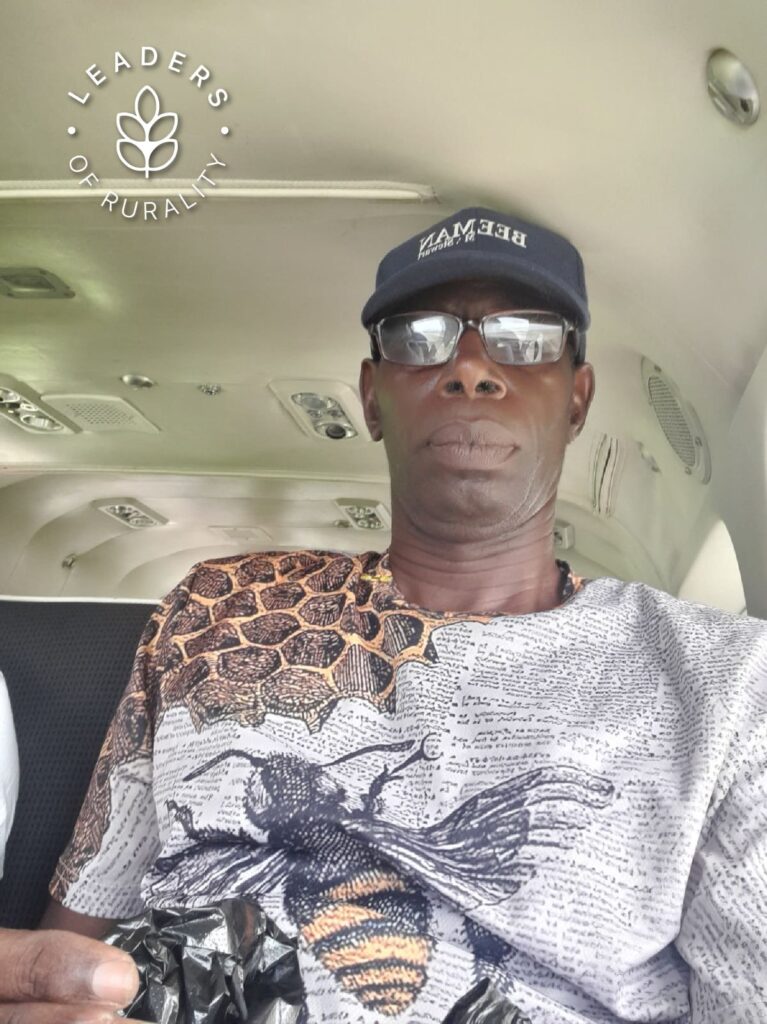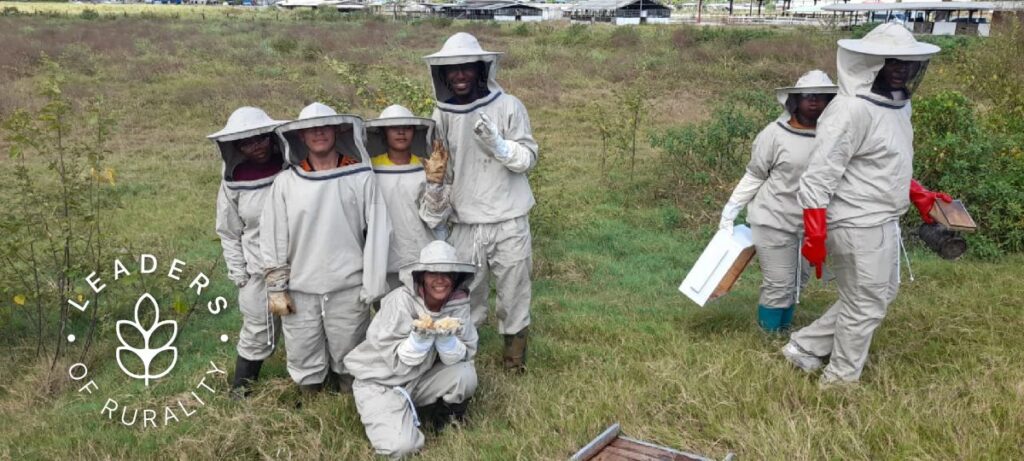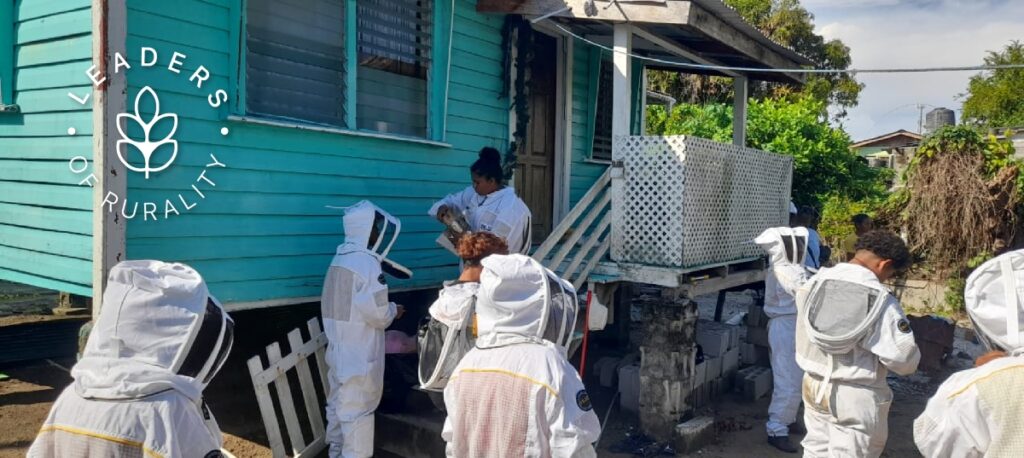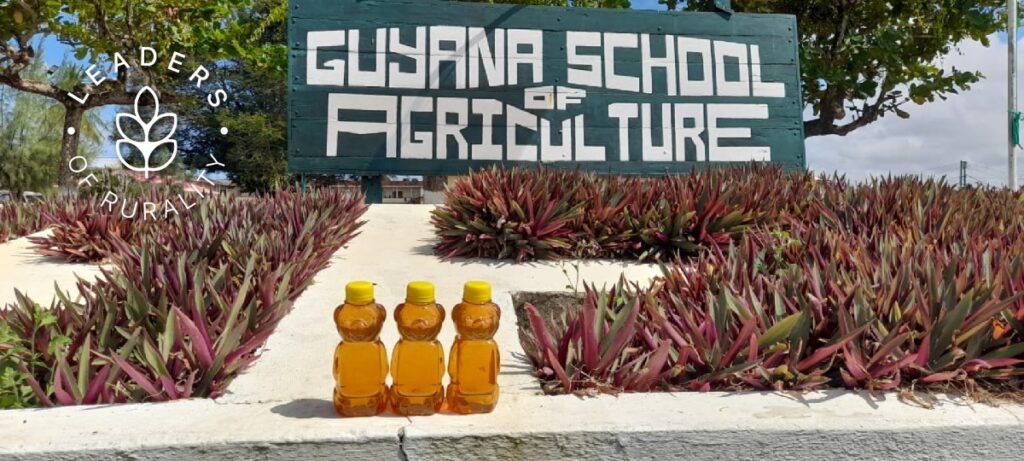
San Jose, 7 April 2025 (IICA) – Linden Stewart recalls that he first spotted a bee at the tender age of seven. By the time he was fourteen, beekeeping was his hobby. Over time, he has become the leading beekeeping expert in Guyana.
For his work in building the sector in his country and his continued efforts to disseminate practical knowledge on bees, the Inter-American Institute for Cooperation on Agriculture (IICA) has named Stewart a “Leader of Rurality of the Americas”.
Stewart was bestowed with the “Soul of Rurality” award as part of an initiative by the specialized organization in agricultural and rural development to highlight the role of men and women who are leaving their mark and making a difference in the rural areas of the hemisphere, while also ensuring the planet’s environmental sustainability and its food and nutritional security.
Our conversation with the beekeeper is a veritable lesson not only on the world of bees, honey and pollination, but also on the geography of his South American nation and snippets of the history of life in Georgetown. Stewart proudly recounts the steps that led him to become an instructor for other beekeepers in Guyana.
First, Linden explains the origin of the predominant type of bee in his country today. When Stewart began to work with these insects, the most common variety in the country was the popular Italian bee, which was active and popular throughout the world. However, looking back in history, he recalls that, “Somewhere around 1976, 1977 or 1978, beekeepers from the Pomeroon region (in northern Guyana) reported that they had noticed changes in the behavioral pattern of bees” in the region. “They complained that these bees were more aggressive and they were not sure why”.
In fact, what was happening was that Africanized bees were slowly migrating to Guyana from Brazil, Venezuela and Suriname. Africanized bees are known to be a class of hybrid bees that are a cross between the African and other European sub-species. They are known to be more defensive and aggressive than Italian bees, for example.
Continuing his story, Stewart recalls that the Africanized bees came in contact with weak colonies in number and did not hesitate to invade these hives and to breed with the local species, thereby “taking over” the country. Stewart noted that, at that time, before they realized what was happening, “beekeepers would still approach their hives as if they were still inhabited by Italian bees, without taking the necessary precautions or wearing adequate clothing”.
For some reason, the authorities at that time “did very little” to curb the invasion of the Africanized bees, and as a result, “Guyana no longer has any Italian bees”, said the expert. “We had to adapt and to learn how to handle these bees”, Stewart continued. Finally, “We got the hang of it, having traveled to every nook and cranny of the country and developed a training program”.

Nowadays, with the benefit of hindsight, he explains that no one really misses the Italian bees. Africanized bees are more pest- and disease-resistant. The country’s beekeepers practically have no concerns about mites or parasites, such as the dreaded varroa mites or the colony collapse disorder (CCD) that results in the mysterious disappearance of massive numbers of worker bees, causing entire hives to collapse.
Stewart uses our conversation as an opportunity to point out that these tremendous benefits of beekeeping in Guyana are periodically certified, which is a task in which IICA is also involved.
Fulfilling the family legacy… and a vocation
Turning back to his own history, Stewart shares a few details about the start of his professional career, as he recalls scenes from everyday life in Georgetown during the 70s, when children “had to obey our parents”.
His parents suggested that he should train to be a librarian and bookbinder; and the young Linden dutifully agreed, completing two years of the course. What his parents didn’t know was that he was secretly rearing bees in hives established in an abandoned building, although beekeeping was still just his hobby.
Later, also feeling compelled to follow in the footsteps of many family members who had passed through Guyana’s security forces, Stewart enrolled in a penitentiary service. After four years in this job and then experimenting with other jobs, the time came when he was ready to devote his efforts completely to bees, somewhere around 1990. “I started with three hives, and I never looked back”, he said.
Currently, in addition to his hives and teaching activities, Stewart manages a bee removal service. “We travel throughout the ten regions of Guyana”, to relocate colonies that are established in homes, deserted buildings, farms, government facilities, trees or abandoned cars at the side of the road”.
To provide a clearer understanding of this work, Stewart released a hypnotic video on YouTube some time ago, where he and one of his colleagues can be seen rescuing some bees that built a colony inside an old tire!
The panels of the improvised hive in the tire are delicately removed one by one and the bees relocated in a special wooden box. The video demonstrates a key trick: once the queen bee is moved to the box, the rest of the colony will surely follow.
When we are removing colonies from inhabited buildings or homes, “we charge a fee, providing a guarantee that the bees will not return”.

Environmental Expertise
On weekends, Stewart tends to his own hives. “I only visit them on Saturdays and Sundays, because bees do not need constant care, unlike raising chickens”, which requires continuous attention. We do have to monitor the environment surrounding the colonies. “We visit the area and observe the types and quality of trees”, he explains. “We try to learn about these species and to ensure that there is fresh water and current close to the hives at the time when the plants are flowering”.
He explains that one has to understand and develop the environment, as well as to ensure accessibility, which are all key aspects in honey production and collection.
A nearby water source is essential, as bees use it to manage the internal temperature of the hive. When it is hot, for example, they go out, fetch water and deposit it inside the colony to evaporate. “The bees work hard” to maintain a healthy hive, he explains.
The Guyanese beekeeper also stresses that the difference between Africanized bees and Italian bees is not only their aggressiveness, but also the way that they pollinate and search for food. If there is insufficient food close to the colony, they travel further afield in search of food. They then return to the hive to show what they have found. If acceptable, the entire colony will move closer to the new food source.
All “these things must be learned” to be a good keeper of African bees, says Linden. They also reproduce more quickly and are more likely to swarm.
Teaching activities
To ensure that this knowledge is passed on to upcoming generations, Stewart has been teaching beekeeping at the Guyana School of Agriculture since 2019. He notes that, “Part of the class involves explaining the importance of bees”. This begins with a simple exercise, with the teacher asking “the bee lovers” in the class to raise their hand. In the classes, which usually consist of approximately thirty students (including several women), Stewart tells us that “if five hands go up that is a lot”.

Stewart begins to resolve this dilemma by conducting several field activities, regularly taking the students to farms with beehives, to learn the fundamentals of beekeeping, including how to capture wild bees and how to build boxes for colonies.
Stewart assures us that, “In a matter of a week, all the students in the class love bees”. (Videos of some of these practical classes can be seen on the beekeeper’s YouTube channel).
He notes that, in addition to these expeditions, “To increase their appreciation of bees, I explain that bees are responsible for food security, since one third of the food that we eat depends on pollination”. The expert does not hesitate to point out that this activity is “more important” than honey production.
Humans, he continues, “cannot survive solely on the five percent of plants that are self-pollinating”. Moreover, “we would not have the trees that absorb carbon dioxide”.
Having put forward all these arguments, it is easy to believe Stewart’s assurance that many of the students in his course at the Guyana School of Agriculture decide to become beekeepers. The expert also points out that, “This has also assisted in making “the honey demand [in Guyana] greater than the supply. We do not need to export and the local market has become very lucrative once again”.
More information:
Institutional Communication Division.
comunicacion.institucional@iica.int
Photo Gallery











